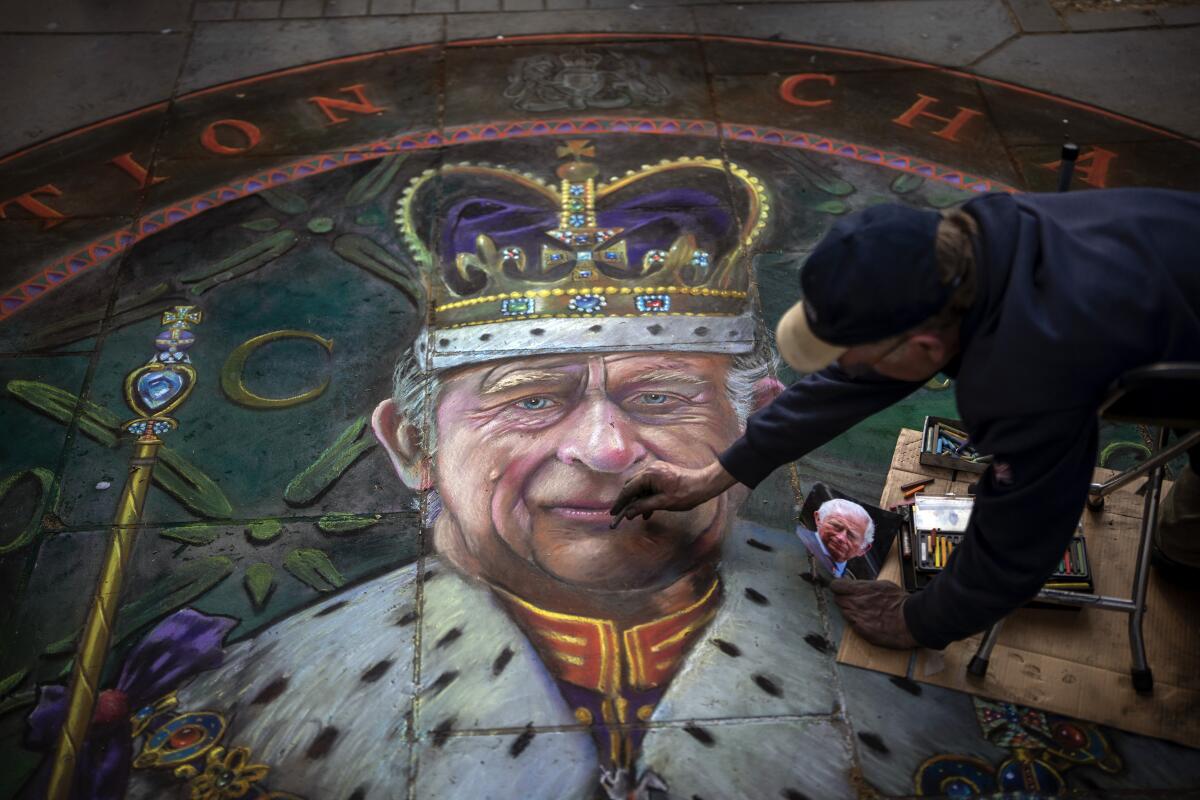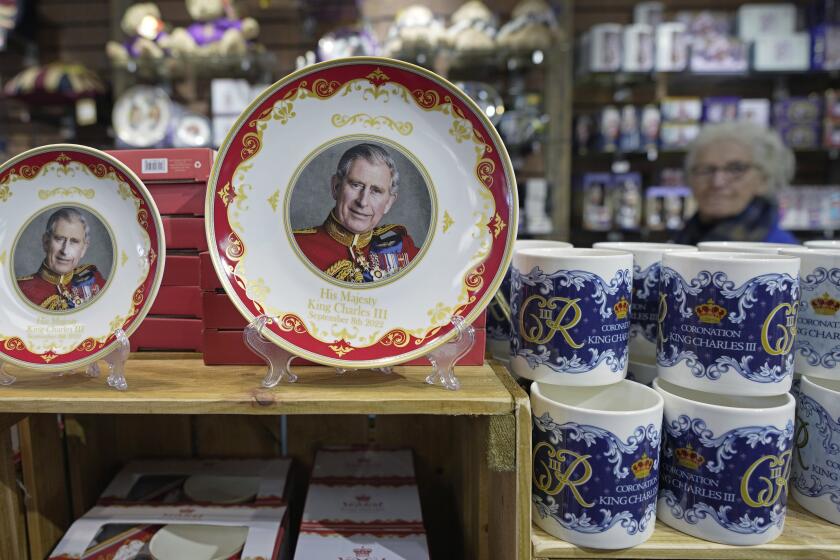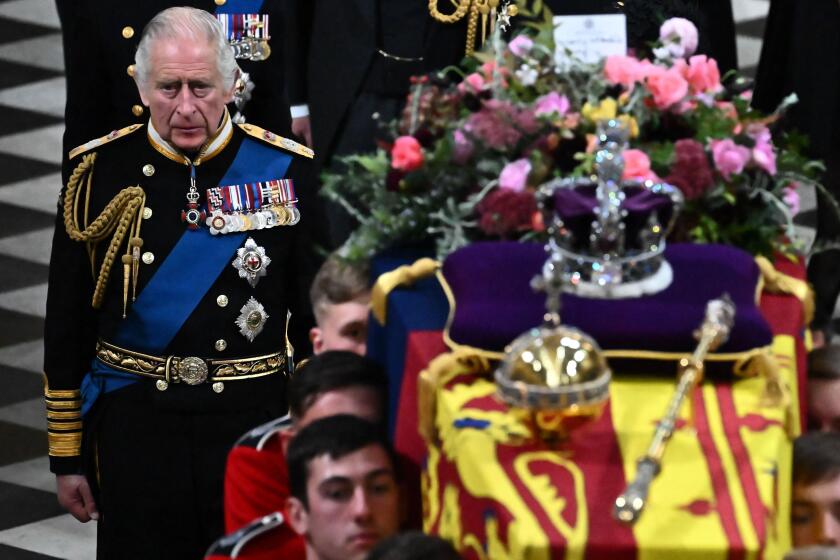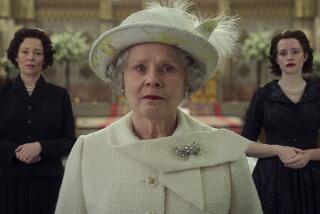Opinion: King Charles has waited a very long time for this. But are you ‘coronation-ready’?

- Share via
I was 13 when a friend’s grandmother looked at me and asked, “Roundhead or Cavalier?” — terms coined to denote opposing sides in the English Civil War. It was the first time I’d been asked to consider my relationship with the monarchy.
There was no need. We were monarchists.
My grandfather served at the end of the British Empire, taking a job with the Indian Civil Service; my grandmother was formally presented to the queen as a debutante. As a child, I ate sandwiches on the Mall waiting for Princess Anne’s wedding procession to go by. As teenagers, we gathered in front of the television to watch Charles and Di get hitched, in what turned out to be a fairy tale with a uniquely tragic ending.
On that eerie Saturday morning, Sept. 6, 1997, we woke up early to go and stand in Hyde Park. The approach of the gun carriage bearing Princess Diana’s coffin was signaled by the clip-clop of hooves and clouds of dust kicked up by the horses on the sandy bridle path known as Rotten Row — originally Route du Roi, Road of the King. We had been robbed of our favorite royal.
But we still had the queen, with her corgis and color-coordinated Launer handbags (a brand now favored by the new queen consort, Camilla). The queen was part of our culture, both iconic and as prosaic as a cup of tea.
In 1977, on the occasion of the Silver Jubilee marking 25 years of Queen Elizabeth II’s reign, the Sex Pistols released their antimonarchy anthem: “God save the queen / The fascist regime … God save the queen / She ain’t no human being.” It went to No. 2 on the singles chart — Rod Stewart was No. 1 — despite having been banned by the BBC.
The fashion designer Vivienne Westwood, who with Pistols promoter Malcolm McLaren designed the accompanying “God Save the Queen” T-shirt (now part of the Metropolitan Museum of Art’s collection), became the darling of the fashion world and earned the title “Queen Viv.” The more queens, the merrier.
Charles’ coronation continues a historic ritual that dates back more than 1,000. It’s captivating to watch, but a little cringey too.
Everything changed on June 24, 2016, when we woke up to the news that 17.4 million British voters (out of a population of more than 65 million) had voted to take us out of the European Union. “It’s not good, is it?” then-Prime Minister David Cameron allegedly said to his Cabinet office minister around 3:30 a.m., when the results came in.
After 43 years in the EU, we were turning back the clock. Overnight we reverted to being allied not with Europe but with our colonial past. A few months later, with perfect timing, Netflix released the first season of “The Crown.” The lavish reimagining of Britain’s royal past made sure to use the Commonwealth countries, mostly former territories of the Empire, as exotic locations for Queen Elizabeth and Prince Philip to tour.
Who needs the EU when you have the Commonwealth? It was one of the lines used to support the anti-European sentiment being whipped up in certain corners of the media. A former prime minister of a Commonwealth country, Australia, was not impressed.
“I’m struck, as the British Parliament moves towards the endgame on Brexit, with the number of times Australia, Canada, New Zealand and India have been advanced by the Brexiteers in the public debate as magical alternatives to Britain’s current trade and investment relationship with the European Union,” Kevin Rudd wrote in the Guardian. “Labour and the Conservative remainers should … support legislation for a second referendum.”
But there was no second referendum on Britain’s EU membership. Instead, we ended up with our second general election in two years and Conservative Party hard-liners presiding over what has been the worst four years of U.K. government in living memory.
Right now in Britain, depending on the day of the week, teachers, nurses, doctors, train conductors, university lecturers and civil servants, among other professionals, are on strike. What we’re seeing is a general strike in everything but name. Britons can’t afford to live on stagnating wages, which haven’t kept up with inflation. The British economy is estimated to be 5.5% poorer now than it would have been had we stayed in the European Union. Everyone is stressed.
“I’ve had record numbers of people phoning, inquiring if they can make a booking to see me over recent months,” a London psychotherapist with a small private practice told me — while acknowledging that those able to afford such care are better off than most. There’s no chance of securing this type of help through the National Health Service.
The symbolic unity provided by a monarch can limit the most problematic forms of populism and thwart efforts by demagogues to make themselves the embodiment of ‘the people.’
The hope is that the coronation will take people’s minds off things. Our new king was once famously quoted as demanding of Diana, “Do you seriously expect me to be the first Prince of Wales in history not to have a mistress?” Now his former mistress, Camilla Parker Bowles, will be queen.
In strictly constitutional terms, coronations are not essential. Rather, they are a moment for public celebration. “Get Coronation-Ready,” the retailers urge us. Commemorative chinaware is on sale: “Bring your King Charles III Coronation Mug to the street party!”
But is there an appetite for street parties and a royal pageant, which will see the country shut down to allow us to watch the parade of golden carriages and diamond tiaras on TV? According to the campaign group Republic, a recent poll found that as few as 15% of British people are enthusiastic about the coronation. Clive Lewis, a Labor member of Parliament, has called for a reformed monarchy, “scaled down in size and cost, less opaque, more open and fit for purpose.”
I conducted a straw poll on one of my mum’s WhatsApp groups. “Are your kids excited by the coronation?” I messaged.
“In a word, no,” came a reply. “The boys are not excited, although we’re all looking forward to the bank holiday.”
Jemima Hunt is an Oxford-based journalist and literary agent.
More to Read
A cure for the common opinion
Get thought-provoking perspectives with our weekly newsletter.
You may occasionally receive promotional content from the Los Angeles Times.












